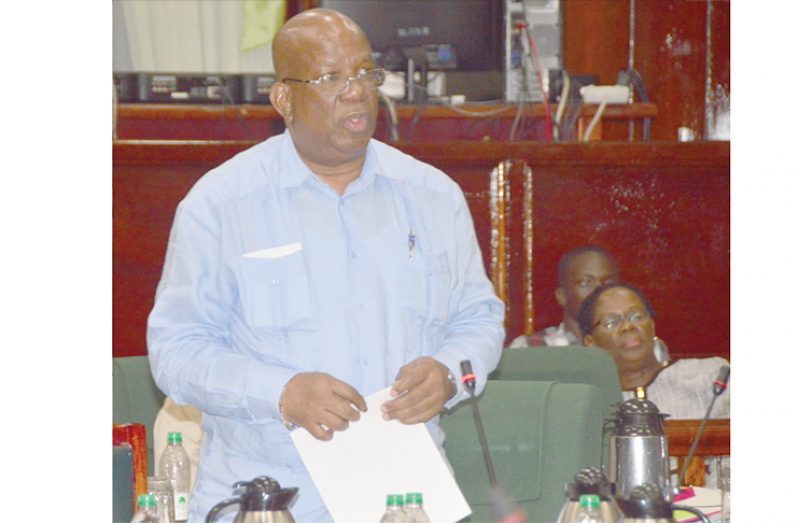MINISTER of Finance Winston Jordan provided mathematics lessons in his final wrap up of the budget debate on Friday night even as he lambasted the Opposition Peoples Progressive Party (PPP) for “falsifying” statistics during the week-long presentations.
Jordan stated that there may be consequences for the “untruths” being peddled by the PPP. Opposition MP Irfaan Ali, who was speaking during the budget debates on Monday, claimed that the President’s team has expended some $1B in travel expenses. On Friday night, Jordan provided clarity on the issue. He said that in the year 2012, the then government budgeted $270M for travel but in fact spent $343.4M that year.
In 2013 a sum of $343M was budgeted but in reality the expenses were $ 412M. He said that in 2014, a sum of $392M was budgeted for travel, however only $352M was spent and Jordan posited that the sum may have dipped because it was the year before the 2015 general and regional elections.
As regards government spending, Jordan said that in 2015, a sum of $392M was budgeted but only $ 263M was spent on travel. He said in 2016, government decided to slash the travel budget to $360M and in reality, only $232M was spent. He said that in 2017, another decision was made to cut the budgeted sums of the previous year to $300M and in actuality, only $294M was spent on travel. The minister said that this year, $300M was budgeted and according to him, based on projections the government’s travel figure will fall below $300M.
Jordan informed the National Assembly too that the opposition MPs travelled “royally” when they were in office. He said MP Gail Teixeira, while serving as an advisor under the PPP government, travelled to Geneva, first class on one occasion. He said that she spent US$500 per night for five nights, when the approved rate of passed by Cabinet stood at US$250 per night.
“So it is amazing that when it comes to this House , people who are coming with equity are not coming with clean hands, but they think they are dealing with people who have short memories,” he said, as he noted that he operated in the “belly of the beast” and that “I now where the skeletons are.”
Jordan said that there appeared a “pattern of falsifying statistics to create confusion and to leave in the minds of the public an image of something that did not really happen.” He said Ali made several mathematical errors in his attempt to explain inflation.
Jordan said that if there are three products, egg, bread and milk, each of which cost $100 and the price of eggs went up by one per cent, bread: two per cent and milk: three per cent, statistically, the opposition calculated that the total increase in price is six per cent. “Now which school these people went to Mr. Speaker?” Jordan asked. He questioned the level of numeracy on the opposite side of the House.
He said in actual fact, a one per cent increase of $100 is $1, two per cent increase of $100 is $2, a three per cent increase of $100 gives $3, a total increase of $6 which translates to a two per cent increase in total. “Now we on this side could give free lessons where this is concerned,” he added, to loud cheers from his colleagues.
He said Opposition MP, Gillian Burton-Persaud wrongfully calculated 0.5 per cent of a million dollars and arrived at $20,000 increase during her presentation. The finance minister reiterated that there is a pattern of “misinformation from the opposition,” using statistics. On Friday night, Jordan noted that the government is private-sector friendly and to this end he described the national budget as private sector friendly. He repeatedly noted too that the APNU/AFC government has not increased “a single tax” since assuming office in 2015.
Jordan said the opposition was not facing reality when it comes to Guyana’s economic performance under the coalition government. Defending Budget 2019, the minister cited the example of purchasing oil on the international markets. He explained that claims made about prices falling did not reflect the reality of the local markets. Guyana was hampered by the fact that its oil and petroleum purchases were constrained since it was a small buyer and its facilities could not take up larger tankers that could have been berthed locally. “Prices were set when our vessels berthed overseas and the price on that day, was what had to be paid,” Minister Jordan explained. The fact that sugar prices were low despite the advent of new markets must not be forgotten, the minister noted.
The opposition’s reference to the past performances of commodities such as gold was reflective of those past days, he posited. The price of rice, for example, the minister reminded, was still lower, though favourable with the Panamanian market, than what obtained for the defunct Venezuelan market. “The world’s economies have changed and many should be aware of the various factors that drive and shape prices, and Guyana’s was no different,” Minister Jordan said.
He assured that the local economy will improve even further with the advent of oil within two years. The opposition had no suggestions or alternatives, Minister Jordan pointed out, “Except for MP Odinga who suggested that the Budget be taken to the Select Committee.” The economy is projected to expand by more than three per cent for 2019 according to the finance minister.



.jpg)








